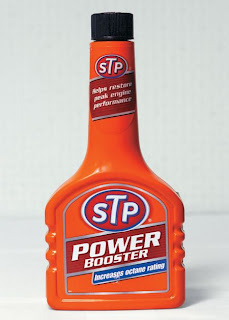
Rishad Tabaccowala, member of the management board at Vivaki, opened the session with a keynote that drove home the need for simplicity. KPIs and results are the currency utilized to judge performance. The "pipes" that target audiences, driven by data, should hide behind the walls, managed by the "plumbers" of data and analysis.
Rishad went on to offer three reasons agencies get hired .... Insights, Inspiration (as opposed to perspiration and hallucination), and Ideas.
An audience question that follows stumped the the panel on "Which Data Finds The Right Audience".... "Who can qualify the quality of third party online data?"
It's a sad commentary on our state of affairs when the data is referred to as so much snake oil.
Very much like STP's Power Booster, few understand the origination and quality of the data but tentatively accept the fact that adding layers of data segments to their targeting options (or in STP's case adding it to your tank) will somehow enhance performance and outcome.
Therein lies the problem that slows acceptance of online as a viable alternative. The industry is running ahead of itself with little regard for mapping a destination or taking the time to truly learn and educate along the way.

Matt Freeman, CEO, Mediabrand Ventures












